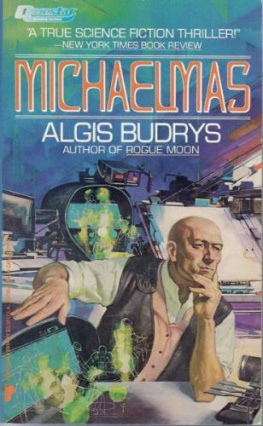Algis Budrys - Who?
Here you can read online Algis Budrys - Who? full text of the book (entire story) in english for free. Download pdf and epub, get meaning, cover and reviews about this ebook. year: 1958, publisher: Pyramid Books, genre: Science fiction. Description of the work, (preface) as well as reviews are available. Best literature library LitArk.com created for fans of good reading and offers a wide selection of genres:
Romance novel
Science fiction
Adventure
Detective
Science
History
Home and family
Prose
Art
Politics
Computer
Non-fiction
Religion
Business
Children
Humor
Choose a favorite category and find really read worthwhile books. Enjoy immersion in the world of imagination, feel the emotions of the characters or learn something new for yourself, make an fascinating discovery.

- Book:Who?
- Author:
- Publisher:Pyramid Books
- Genre:
- Year:1958
- Rating:4 / 5
- Favourites:Add to favourites
- Your mark:
- 80
- 1
- 2
- 3
- 4
- 5
Who?: summary, description and annotation
We offer to read an annotation, description, summary or preface (depends on what the author of the book "Who?" wrote himself). If you haven't found the necessary information about the book — write in the comments, we will try to find it.
Who? — read online for free the complete book (whole text) full work
Below is the text of the book, divided by pages. System saving the place of the last page read, allows you to conveniently read the book "Who?" online for free, without having to search again every time where you left off. Put a bookmark, and you can go to the page where you finished reading at any time.
Font size:
Interval:
Bookmark:
Who?
by Algis Budrys
PART ONE
CHAPTER ONE
1
It was near the middle of the night. The wind came up from the river, moaning under the filigreed iron bridges, and the weathercocks on the dark old buildings pointed their heads north.
The Military Police sergeant in charge had lined up his receiving squad on either side of the cobbled street. Blocking the street was a weathered concrete gateway with a black-and-white-striped wooden rail. The headlights of the MP super-Jeeps and of the waiting Allied Nations Government sedan glinted from the raised shatterproof riot visors on the squads varnished helmets. Over their heads was a sign, fluorescing in the lights:
YOU ARE LEAVING THE ALLIED SPHEREYOU ARE ENTERING THE SOVIET SOCIALIST SPHEREIn the parked sedan, Shawn Rogers sat waiting with a man from the ANG Foreign Ministry beside him. Rogers was Security Chief for this sector of the ANG administered Central European Frontier District. He waited patiently, his light green eyes brooding in the dark.
The Foreign Ministry representative looked at his thin gold wristwatch. Theyll be here with him in a minute. He drummed his fingertips on his briefcase. If they keep to their schedule.
Theyll be on time, Rogers said. Thats the way they are. They held him four months, but now theyll be on time to prove their good faith all along. He looked out through the windscreen, past the silent drivers shoulders, at the gateway. The Soviet border guards on the other side Slavs and stumpy Asiatics in shapeless quilted jackets were ignoring the Allied squad. They were clustered around a fire in an oil drum in front of their checkpoint shack, holding their hands out to the warmth. Their shroud-barreled submachine guns were slung over their shoulders, hanging clumsily and unhandily. They were talking and joking, and none of them were bothering to watch the frontier.
Look at them, the Foreign Ministry man said peevishly. They dont care what we do. Theyre not concerned if we drive up with an armed squad.
The Foreign Ministry man was from Geneva, five hundred kilometers away. Rogers had been here, in this sector, for seven years. He shrugged. Were all old acquaintances by now. This frontiers been here forty years. They know were not going to start shooting, any more than they are. This isnt where the war is.
He looked at the clustered Soviets again, remembering a song hed heard years ago: Give the Comrade With the Machine Gun the Right to Speak. He wondered if they knew of that song, over on their side of the line. There were many things on the other side of the line that he wanted to know. But there was little hope for it.
The war was in all the worlds filing cabinets. The weapon was information: things you knew, things youd found out about them, things they knew about you. You sent people over the line, or you had them planted from years ago, and you probed. Not many of your people got through. Some of them might. So you put together the little scraps of what youd found out, hoping it wasnt too garbled, and in the end, if you were clever, you knew what the Soviets were going to do next.
And they probed back. Not many of their people got through at least, you could be reasonably sure they didnt but, in the end, they found out what you were going to do next. So neither side did anything. You probed, back and forth, and the deeper you tried to go, the harder it was. For a little distance on either side of the line, there was some light. Farther on, there was only a dark fog. And some day, you had to hope, the balance would break in your favor.
The Foreign Ministry man was taking out his impatience in talk. Why the devil did we give Martino a laboratory so near the border in the first place?
Rogers shook his head. I dont know. I dont handle strategy.
Well, why couldnt we get a rescue team of our own in there after the explosion?
We did. Theirs just got in first. They moved fast and took him away. And he wondered if that had been a simple piece of luck.
Why couldnt we take him back from them?
I dont handle tactics on that level. I imagine we might have had trouble, though, kidnapping a seriously hurt man out of a hospital. And the man was an American national. Suppose hed died? The Soviet propaganda teams would have gone to work on the Americans, and when the next ANG bill came up in their Congress, they might not be so quick with their share of next years budget. Rogers grunted to himself. It was that kind of war.
I think its a ridiculous situation. An important man like Martino in their hands, and were helpless. Its absurd.
Thats the kind of thing that gives you your work to do, isnt it?
The Foreign Ministry representative changed his tack. I wonder how hes taking it? He was rather badly knocked about in the explosion, I understand.
Well, hes convalescent now.
Im told he lost an arm. But I imagine theyll have taken care of that. Theyre quite good at prosthetics, you know. Why, as far back as the nineteen forties, they were keeping dogs heads alive with mechanical hearts and so forth.
Mm. A man disappears over the line, Rogers was thinking, and you send out people to find him. Little by little, the reports come trickling in. Hes dead, they say. Hes lost an arm, but hes alive. Hes dying; We dont know where he is. Hes been shipped to Novoya Moskva. Hes right here, in this city, in a hospital. At least, theyve got somebody in a hospital here. What hospital?
Nobody knows. Youre not going to find out any more. You give what you have to the Foreign Ministry, and the negotiations start. Your side closes down a highway across the line. Their side almost shoots down a plane. Your side impounds some fishing boats. And finally, not so much because of anything your side had done but for some reason of their own, their side gives in.
And all this time, a man from your side has been lying in one of their hospitals, broken and hurt, waiting for you to do something.
Theres a rumor he was quite close to completing something called a K-Eighty-E-Eight, the Foreign Ministry man went on. We had orders not to press too hard, for fear theyd realize how important he was. That is, in the event they didnt already know. But, of course, we were to get him back, so we couldnt go too soft. Delicate business.
I can imagine.
Do you think they got the K-Eighty-Eight out of him?
They have a man on their side called Azarin. Hes very good. How can I possibly know until Ive talked to Martino? But Azarins damned good.
He wished he knew more about Azarin. He wished he knew more about the Soviets. Everything he knew about the Russo-Chinese Incident of a decade ago, for instance, told him it had been a war, and that the Russians had lost it. But, if so, then why was the capital city New Moscow and not New Peking? Why was the army half Chinese but the government Caucasian? If there had still been Western embassies and trade missions behind the Curtain, it might be possible to know. But there was none of that. There was nothing but opacity in that land.
Out beyond the gateway, two headlights bloomed up, turned sideward, and stopped. The rear door of a Tatra limousine snapped open, and at the same time one of the Soviet guards went over to the gate and flipped the rail up. The Allied MP sergeant called his men to attention.
Rogers and the Foreign Ministry representative got out of their car.
A man stepped out of the Tatra and came to the gateway. He hesitated at the border and then walked forward quickly between the two rows of MPs.
Good God! the Foreign Ministry man whispered.
The lights glittered in a spray of bluish reflection from the man in the gateway. He was mostly metal.
2
He was wearing one of their shapeless, drab civilian suits, with lumpy shoes and a striped brown shirt. His sleeves were too short, and his hands hung far out. One was flesh and one was not. His skull was a polished metal ovoid, completely featureless except for a grille where his mouth ought to be, and a half-moon recess, curving upward at the ends, where his eyes lurked. He stood, looking ill at ease, at the end of the two rows of soldiers. Rogers came up to him, holding out his hand. Lucas Martino?
Font size:
Interval:
Bookmark:
Similar books «Who?»
Look at similar books to Who?. We have selected literature similar in name and meaning in the hope of providing readers with more options to find new, interesting, not yet read works.
Discussion, reviews of the book Who? and just readers' own opinions. Leave your comments, write what you think about the work, its meaning or the main characters. Specify what exactly you liked and what you didn't like, and why you think so.



![Alfred C. Martino - Audio Nuggets: How To Get A Street Named [Text]](/uploads/posts/book/400603/thumbs/alfred-c-martino-audio-nuggets-how-to-get-a.jpg)

